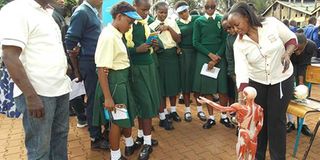Students urged to study sciences to spur innovation

Murang'a KMTC Deputy Principal Maryanne Muritu (right) speaks to students at Kahuhia Girls High School on May 27, 2018. She urged them to take more interest in science subjects which she said are vital in spurring innovation which will in turn help in growing Kenya's economy. PHOTO | NDUNG'U GACHANE | NATION MEDIA GROUP
What you need to know:
- The stakeholders seek to sensitise students to put more effort in science subjects to make them innovative.
- Ms Muritu attributed the decline of student population in KMTC to the mass failure in science subjects.
- She is heading a team going round secondary schools to talk to students.
Stakeholders in science and technology, engineering and mathematics fields have embarked on a mission to convince secondary school students to put more effort in science subjects to avert the looming shortage of innovators.
This is after a study showed mass failure in science subjects.
The stakeholders, led by Murang’a Kenya Medical Training Collage (KMTC) Deputy Principal Maryanne Muritu, have initiated career days in secondary schools to sensitise students to put more effort in science subjects to enable them enrol in various courses in institutions of higher learning and as a result make them innovative in order to spur Kenya’s economy.
KCPE SCORES
According to the recent report titled Status of University Education in Kenya, 98,219 students out of 653,549 who did Mathematics in the 2018 KCSE exam scored C+ while in Biology 584,924 sat the exam but only 33,126 got C+ and above. In Chemistry 650,898 candidates sat the exam and 73,566 scored C+ and above.
The report prepared by university vice chancellors proposes the lowering of the entry grades in Biology from C+ to C to make students take science courses in colleges to avert the acute shortage of experts in key areas of the economy.

Murang'a KMTC Deputy Principal Maryanne Muritu and other stakeholders speaks to students at Kahuhia Girls High School on May 27, 2018. They have started career days in secondary schools to sensitise students on sciences. PHOTO | NDUNG'U GACHANE | NATION MEDIA GROUP
Ms Muritu, who is heading a team going round secondary schools, attributed the decline of student population in KMTC to the mass failure in science subjects, adding that only 40 percent of the students from secondary schools are qualified for the medical diploma.
STUDENT POPULATION
“Our student population has drastically gone down because we can’t admit unqualified students since we are regulated by councils like the Nursing Council of Kenya and the Clinical Officers Council.
“If the trend continues, the economy of the country will be greatly affected in the near future because science underscores the pivotal role in the economy and job creation and also tomorrow’s innovators,” Ms Muritu said.
Speaking at Kahuhia Girls High School on Monday where they offered free career guidance to students from over 20 schools, Ms Muritu urged female students to take science courses serious, noting that in Kenya like in many other countries, women are underrepresented in science and technology, engineering and mathematics.




